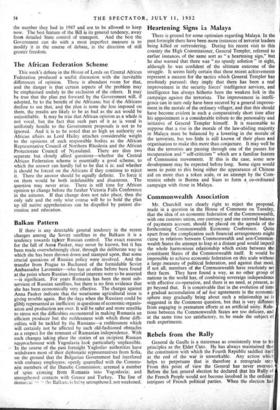The African Federation Scheme
This week's debate in the House of Lords on Central African Federation produced a useful discussion with the inevitable differences of opinion. There is abundant room for that, and the danger is that certain aspects of the problem may be emphasised unduly to the exclusion of the others. It may be true that the plan put forward by the Government will, if adopted, be to the benefit of the Africans; but if the Africans decline to see that, and the plan is none the less imposed on them, the results are likely to be as. bad as the act would be unjustifiable. It may be true that African opinion as a whole is not vocal, but the fact that such part of it as is vocal is uniformly hostile to the government proposals is not to be ignored. And it is to be noted that so high an authority on African affairs as Lord Hailey attaches considerable weight to the opinions of such responsible bodies as the African Representative Council of Northern Rhodesia and the African Protectorate Council of Nyasaland. There are thus two separate but closely allied questions—whether the Central African Federation scheme is essentially a' good- scheme, to which the answer can hardly fail to be that it is; and whether it should be forced on the Africans if they continue to reject it. There the answer should be equally definite. To force it on them would be both indefensible and disastrous. The question may never arise. There is still time for African opinion •co change before the further Victoria Falls Conference in the autumn. If that change does not take place, then the only safe and the only wise course will be to hold the plan up till native apprehensions can be dispelled by patient dis- cussion and education.







































 Previous page
Previous page